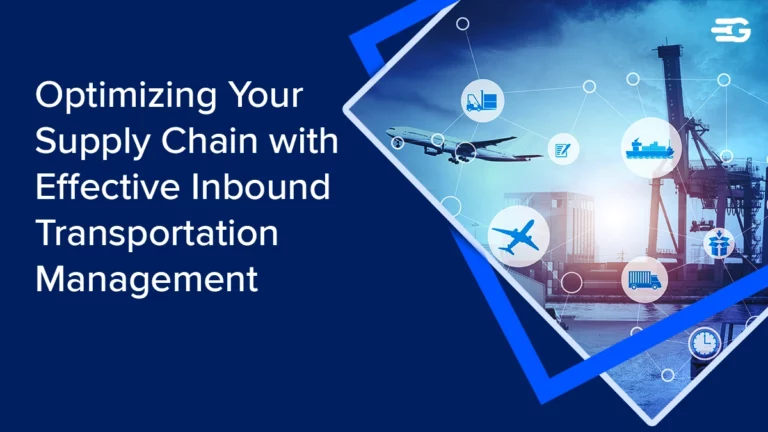Top 12 Cloud-based Supply Chain Management Software to consider for your business
Table of Contents
Managing a supply chain can be a complex task. If you’re like most businesses, you’ve likely experienced disruptions or inefficiencies in your operations. According to a recent survey, only 6% of companies report full visibility of their supply chains, leaving 69% in the dark. That’s a huge risk, especially when disruptions can cause financial losses of up to 62%.
Luckily, cloud-based supply chain management software can help eliminate these challenges. These tools enable businesses to improve visibility, automate processes, and make data-driven decisions. In this blog, we will explore the top 12 cloud-based Supply Chain Management software solutions that can help streamline your supply chain operations, reduce costs, and give you a competitive edge.
Criteria for Choosing the Best SCM Software
Choosing the right cloud-based SCM software for your business can be overwhelming, especially with so many options. Here are a few criteria to consider:
- Ease of Integration: How well does the software integrate with your existing systems (ERP, CRM, etc.)?
- Customization: Does it allow you to tailor the features to your unique needs?
- Analytics and Reporting: Look for a solution that provides actionable data, so you can make informed decisions.
- Pricing: Consider the subscription model and ensure it fits your budget.
- Cloud Management: If your organization uses multiple cloud providers, consider how well the software supports overall cloud management to avoid complexity and ensure smooth operations across platforms.
- Support: Make sure the software provider offers strong customer support to assist you when needed.
Top 12 Cloud-Based Supply Chain Management Software Solutions for 2025
| Software | Best For | Pros | Cons |
| GoComet | Businesses prioritizing freight management, real-time visibility, and cost efficiency. | 1. Centralizes vendor communication, eliminating emails and calls. 2. Real-time tracking, predictive ETAs, and cost comparison. 3. Automates tasks, saving time and improving efficiency. | 1. No SKU-level tracking for detailed inventory management. |
| Oracle SCM Cloud | Enterprises seeking a scalable, feature-rich platform to manage complex supply chains. | 1. Flexible and customizable to diverse business needs. 2. Supports supply chain operations effectively. 3. Provides predictive analytics for better decisions. | 1. Pages are not very intuitive, with poor graphics and integration. 2. No easy way to provide reports from third-party reporting tools. |
| JDA SCM (Blue Yonder) | Enterprises in retail, manufacturing, and logistics. | 1. Provides accurate demand predictions and optimized planning. 2. Enhances real-time tracking for better decision-making. 3. Adapts to large, complex supply chains across industries. | 1. Struggles with complex integrations and rigid data models. 2. Lacks robust integration and skilled implementation support. |
| Epicor SCM | Small to mid-sized manufacturers and distributors seeking centralized SCM. | 1. Flexible deployment (cloud or on-premises ) 2. Easy integration with existing systems 3. Improves inventory visibility and control. | 1. Limited scalability for very large enterprises 2. Interface feels outdated to some users. |
| Descartes SCM | Companies involved in global shipping, logistics, and transportation management. | 1. Focused on transportation and logistics 2. Great for international shipping and compliance 3. Modular design for scalability. | 1. Limited features for inventory management. |
| Infor CloudSuite SCM | Warehousing and distribution-focused businesses. | 1. Easy to use with intuitive design and helpful documentation. 2. Great for demand planning and supply chain management. | 1. Integration and setup can be challenging for larger organizations. |
| Kinaxis RapidResponse | Businesses requiring real-time supply chain insights. | 1. Responsive vendor support for addressing weaknesses. 2. Works well with the right implementation partner. | 1. Implementation can be complex and not as simple as promised. 2. Limited capabilities for advanced forecasting and modeling inventory policies. |
| SAP IBP | Enterprises managing global supply chains. | 1. Easy to use system with excellent data output and smooth implementations. 2. Improves business operations with continuous software advancements and extensive capabilities. | 1. Slow turnaround on upgrades and service requests. |
| Manhattan Associates SCM | Retailers and distributors managing extensive warehouse operations. | 1. Continuously adds tools to improve efficiency. 2. Responsive and helpful customer service | 1. Only one load can be duplicated at a time. 2. Too many tabs, making navigation cumbersome. |
| Microsoft Dynamics 365 SCM | Retailers with complex distribution networks. | 1. Integrates ERP and SCM for streamlined operations. 2. Real-time data for quick decision-making. 3. Customizable to fit business needs. | 1. Complex implementation process. 2. Licensing and cost management can be challenging. |
| Logility | Companies aiming to enhance inventory management and improve demand forecasting. | 1. Easy to use, reducing the learning curve for new users. 2. Comprehensive system with integrated modules and enhanced planning features. 3. Knowledgeable, responsive team providing effective customer service and guidance. | 1. Reporting and remanufacturing struggles with large SKU portfolios. 2. Setup is slow, with vague and unhelpful support responses. |
| Coupa | Businesses focused on supply chain modeling and optimization. | 1. Focused on cost reduction and efficiency 2. Tailored for supply chain strategists | 1. Lacks some operational features of other tools |
GoComet
GoComet is a cloud-based supply chain platform built to manage freight and logistics. It offers real-time container tracking and predictive ETAs, so teams can avoid delays and plan accurately. With reverse auctions, it helps secure the best freight rates by automating vendor negotiations. The platform also handles invoice audits, flagging discrepancies, and preventing overpayments.
GoComet includes a CO₂ tracker that reports emissions, helping companies measure and reduce their environmental impact. It uses AI-driven analytics to show savings, vendor performance, and shipment trends in one place. However, it does not support SKU-level tracking, limiting detailed inventory views. It also requires strong system integration and clean data to run effectively.
This tool is best for logistics teams managing large shipment volumes and looking to reduce costs through automation and better visibility.
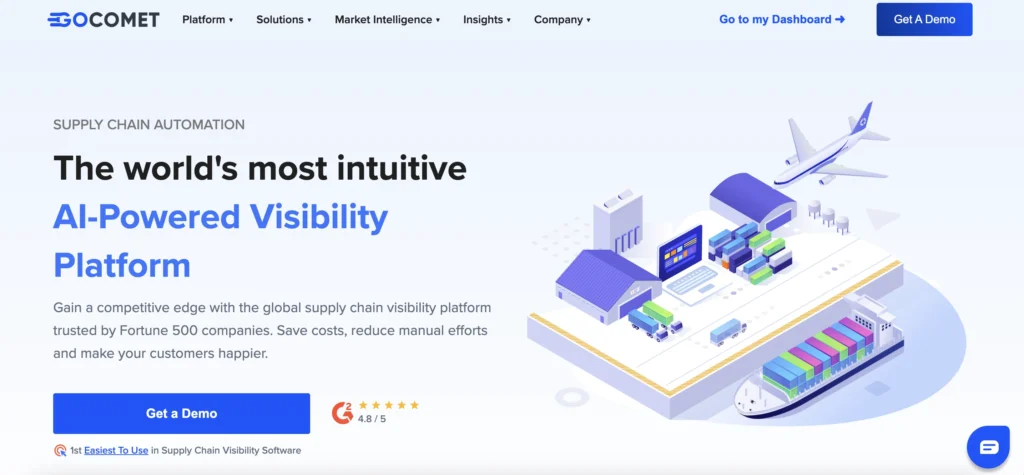
Ratings:
G2 Rating: 4.8/5
Gartner Rating: 4.9/5
Testimonials: “With Gocomet, our profits has been increasing. We get the best rates from freight forwarders resulting in huge profits. We can also use the reports that can be downloaded from the platform to get the complete analysis of our savings, vendor’s participation and much more.”
Oracle SCM Cloud
Oracle SCM Cloud is a cloud-based platform built for large, complex supply chains. It manages planning, inventory, and procurement in one system. The platform uses predictive analytics to forecast risks and improve decision-making. It also offers real-time shipment tracking, using machine learning to update transit times and reduce delays.
The system supports global shipment optimization, helping businesses plan and execute cross-border logistics more efficiently. Users can also compare alternate routes and carriers to cut costs and avoid bottlenecks. However, the platform can be hard to configure for specific needs. Many users report challenges with integration and limited support for cross-functional reporting.
The interface has a steep learning curve, especially for forecasting and advanced planning tools. Some teams also find the shift to full cloud functionality slow. Oracle SCM Cloud works best for enterprises that need scalability and are prepared to invest time in setup and training.
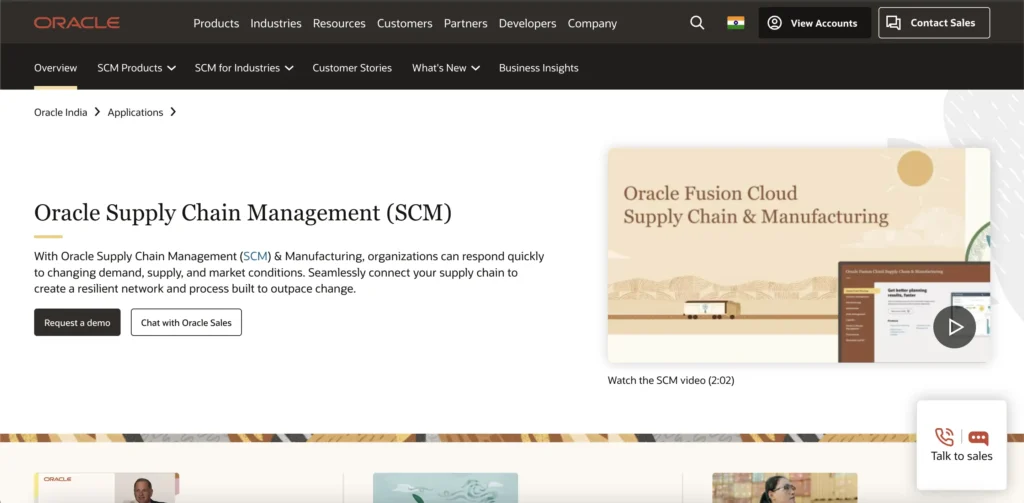
Ratings:
G2 Rating: 4.5/5
Gartner Rating: 4.7/5
Testimonials: “Overall Experience has been satisfactory. However, we have witnessed challenges while developing cross-functional or integrated reports.”
SAP Supply Chain Management (SCM)
SAP SCM is built to manage and optimize supply chains from end to end. It connects inventory, planning, logistics, and suppliers in one platform. The system runs on real-time data, giving teams accurate insights to react quickly to changing demand. When linked with SAP ERP, it offers full visibility and smoother workflows.
The platform uses AI and machine learning to improve forecasting, inventory control, and delivery planning. It also includes sustainability tools that track emissions and help reduce waste. This makes it a strong fit for companies with environmental goals.
However, implementation takes time and often requires significant IT support. The interface is complex, and users need training to navigate it effectively. SAP SCM works best for enterprises already using SAP systems and ready for a detailed setup process.
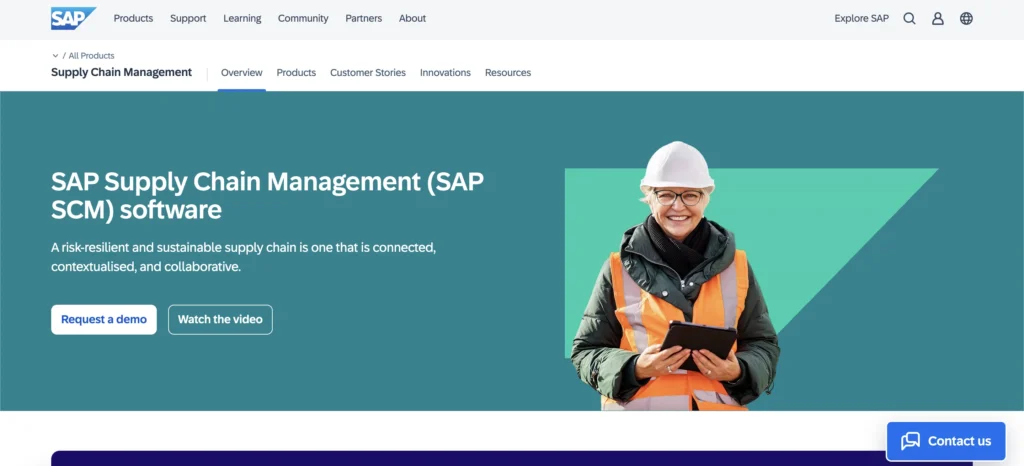
Ratings:
G2 Rating: 4.2/5
Gartner Rating: 4.2/5
Testimonials: “Helps to create any dashboard required for the Business & for Proper Decision Making. Initial Setup of the data takes time.”
Blue Yonder
Blue Yonder is a cloud-based SCM platform focused on demand forecasting and inventory optimization. It uses AI algorithms to predict demand and adjust stock levels, helping businesses avoid overstock and shortages. The system includes tools for warehouse management that improve visibility and speed up fulfillment.
For retail and manufacturing, it offers industry-specific features that support faster decision-making and smoother operations. Teams can also collaborate in real time, which improves coordination across suppliers and internal functions. However, the platform has rigid data models that make complex scenario planning difficult. It also lacks strong integration across all functions, and many users face challenges finding skilled implementation support.
Blue Yonder is a good fit for retailers and manufacturers with advanced planning needs but may require extra effort to integrate fully into broader systems.
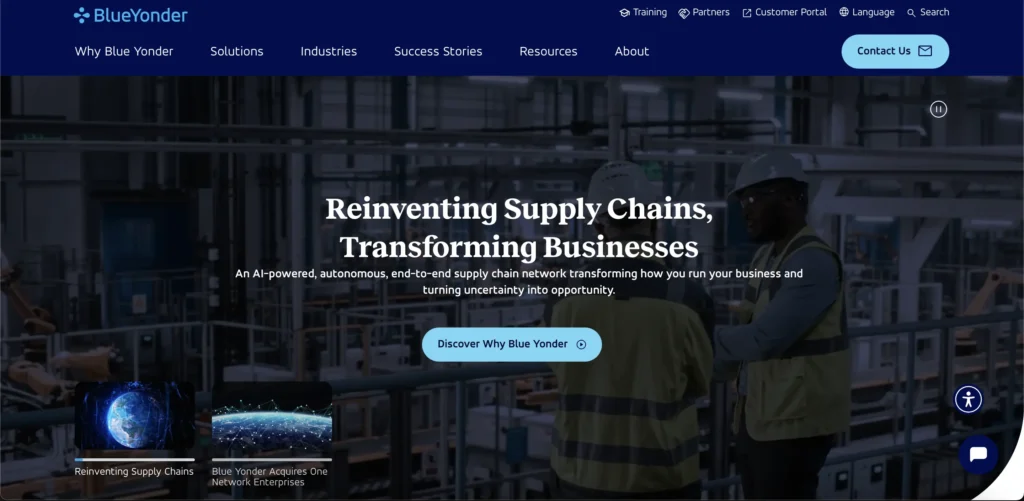
Key Features:
- AI-Powered Forecasting: Leverages artificial intelligence to accurately predict demand and optimize inventory planning, helping businesses prepare for future needs.
- Inventory and Warehouse Management: Improves visibility and control over inventory levels and warehouse operations, ensuring efficient stock management and order fulfillment.
- Real-Time Supply Chain Collaboration: Enables teams to collaborate instantly on projects, enhancing communication and coordination across the supply chain.
- Retail-Specific Solutions: Provides specialized tools designed to optimize supply chain operations for the retail and consumer goods industries, improving efficiency and responsiveness.s sectors.
Limitations:
- Weak Scenario Capabilities and Rigid Data Model: The platform struggles with complex integrations and process flows due to its limited scenario capabilities and inflexible data model.
- Limited End-to-End Integration and Support: There is a lack of robust integration across key process areas, and the availability of skilled implementation resources is currently insufficient.
Ratings:
G2 Rating: 4.6/5
Gartner Rating: 4.5/5
Testimonials: “It is easy to integrate with the Blue Yonder WMS module, however, for other systems you will need to develop integration.”
Epicor SCM
Epicor SCM is designed for small to mid-sized manufacturers and distributors. It supports cloud and on-premises deployment, giving businesses flexibility based on their IT setup. The platform connects key functions like procurement, logistics, and demand forecasting into one system.
It delivers real-time visibility across the order-to-cash process, helping teams react quickly to changes. Epicor also enables collaboration with suppliers and trading partners, which improves coordination across the supply chain. Its tools help businesses stay agile in response to disruptions.
However, customer support is often slow and unclear, which can delay problem resolution. Users also report frustrations with delayed updates, especially during version transitions. Epicor works best for companies that need a centralized SCM system with flexible deployment but can manage some support limitations.
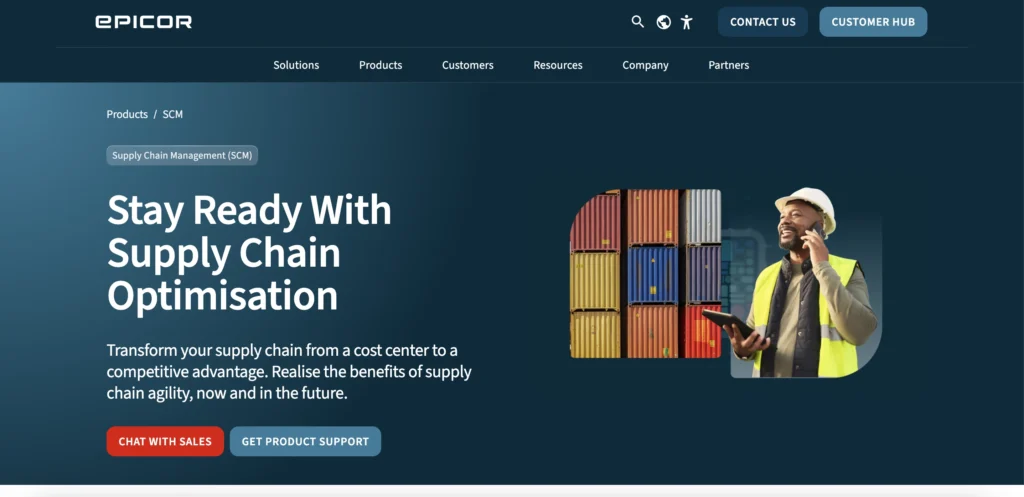
Key Features:
- Adaptability to Market Changes: Ensures your organization can quickly adapt to disruptions and changing market conditions, minimizing potential downtime.
- Real-Time Insights: Provides essential, real-time visibility throughout the entire order-to-cash value stream, helping you stay informed and agile.
- Collaboration Across the Ecosystem: Fosters seamless collaboration between all stakeholders in the supply chain, including manufacturers, suppliers, and trading partners.
- Integrated Supply Chain Management: Connects various supply chain functions (make, move, sell) for streamlined operations and better decision-making
Limitations:
- Poor Support and Communication: Users struggle with unhelpful or unclear support, making issue resolution difficult and delaying progress.
- Slow Upgrades and Updates: Software updates and upgrades can be slow, causing frustration during transitions, especially when resources are limited.
Ratings:
G2 Rating: 3.8/5
Gartner Rating: 4.1/5
Testimonials: “the software is improving every year. just the team is a lil slow on moving forward with the update software.”
Descartes SCM
Descartes SCM is built for companies that manage high logistics volumes and complex fleet operations. It offers real-time shipment tracking, giving teams instant updates to improve visibility and reduce delays. The platform supports customs compliance and route optimization, which are essential for global shipping.
Its order automation feature speeds up order entry and reduces manual errors. Businesses can also manage carriers in one place, with access to rates, performance metrics, and contract details. The system helps teams consolidate shipment data for faster analysis and better decisions.
However, it lacks batch load duplication, which slows down workflows for high-volume users. The interface also feels cluttered, with too many tabs that can overwhelm new users. Descartes works best for logistics-heavy businesses that need strong tracking and routing tools but are ready to navigate a more complex UI.
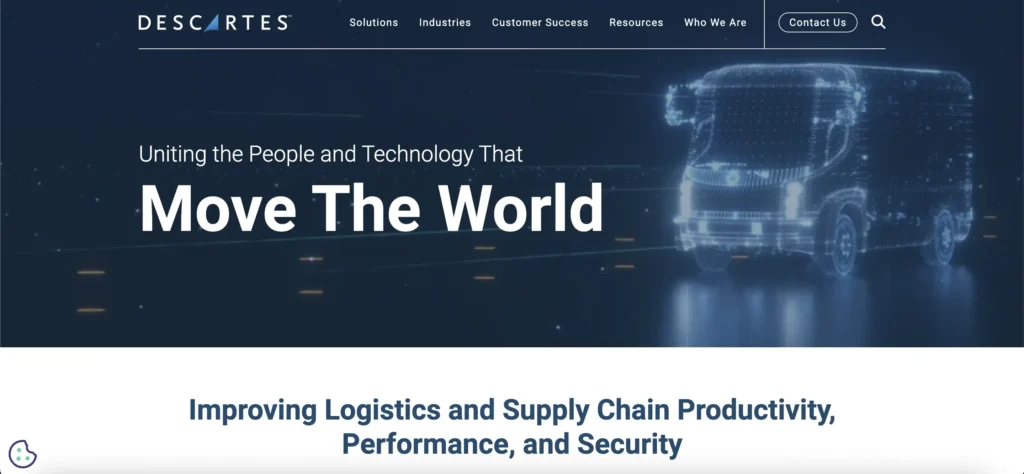
Ratings:
G2 Rating: 4.6/5
Gartner Rating: 4.0/5
Testimonials: “Having everything right in front of me and making it hard to make any mistakes. Sometimes I feel like there are too many tabs that need to be more condensed.”
Infor CloudSuite SCM
Infor CloudSuite SCM is built for businesses focused on warehouse and transportation management. It uses AI-powered analytics to detect bottlenecks and recommend improvements in real time. The platform helps streamline operations by automating key supply chain tasks, reducing manual work and boosting efficiency.
It includes tools for supplier and inventory management, which support accurate stock tracking and better supplier coordination. Collaboration features also help connect suppliers, customers, and internal teams for faster decision-making. The software works best when used with other Infor products, offering seamless integration within that ecosystem.
However, the platform can be complex and slow to implement, especially for companies without strong IT support. Its cost and scale are better suited to large enterprises, making it less practical for small or mid-sized businesses. Infor CloudSuite is ideal for companies that prioritize distribution and warehouse visibility and need enterprise-level functionality.
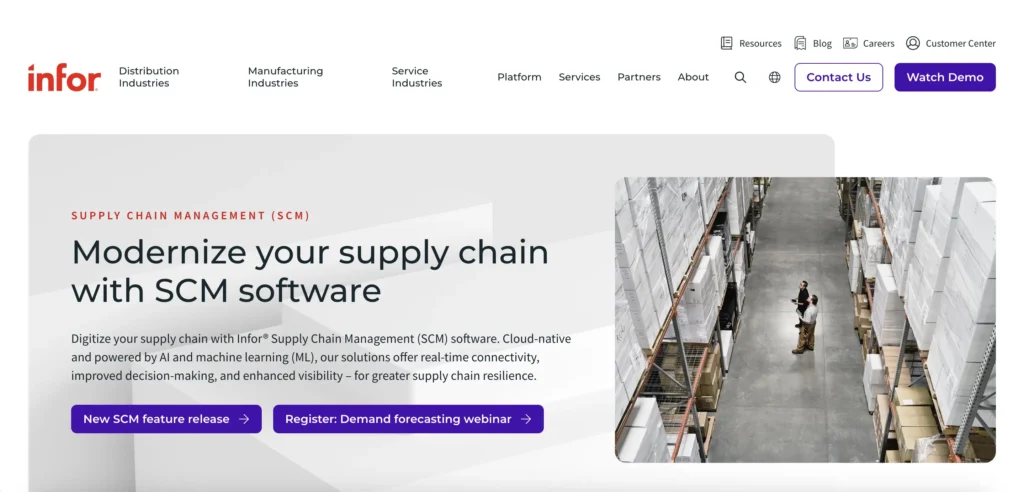
Ratings:
G2 Rating: 4.0/5
Gartner Rating: 4.0/5
Testimonials: “CloudSuite has a lot of promise but the challenges in implementation, delivery and integration hold it back a bit. No doubt, it is easy to use for a beginner but at the same time it was super difficult to deploy and launch it for the first time within our organization.“
Kinaxis Maestro
Kinaxis RapidResponse is built for companies that need real-time supply chain visibility and fast decision-making. It monitors supply chain performance live, helping teams spot problems early and act before they escalate. The platform supports scenario planning, allowing users to test strategies and prepare for disruptions.
It integrates data from multiple systems, creating a single, unified view of the supply chain. This improves collaboration and speeds up response times across departments. Its risk management tools help detect delays, shortages, or supplier issues before they impact operations.
However, the platform depends on clean, accurate data to work well. Poor or outdated inputs can limit its effectiveness. Kinaxis is best for companies that face frequent supply chain changes and need agile, data-driven planning in real time.
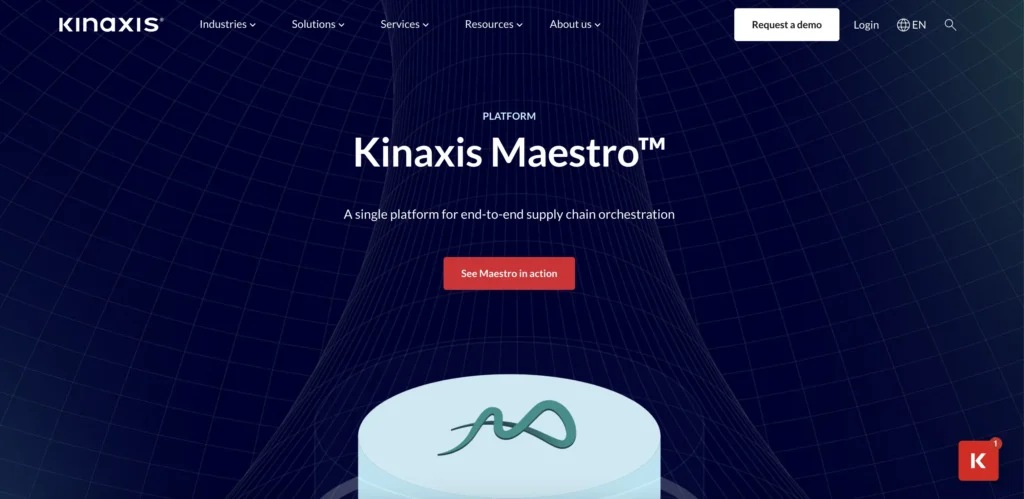
Ratings:
G2 Rating: 4.0/5
Gartner Rating: 4.5/5
Testimonials: “System had limted capabilities for advanced statistical forecasting and was uable to model customer inventory policies to help with predicting shipments.
Manhattan Associates SCM
Manhattan Associates SCM is designed for retailers and distributors managing omnichannel operations. It connects online and physical supply chains to improve inventory accuracy and order fulfillment. The system uses advanced algorithms to optimize delivery routes, helping reduce shipping time and cost.
It provides real-time data integration, allowing faster decisions and smoother execution across warehouse, transport, and store operations. The platform handles demand forecasting and inventory management, making it easier to meet customer expectations across channels.
However, the setup is complex and takes time, especially when integrating with existing systems. The solution is also priced and scaled for larger enterprises, which may limit its fit for smaller businesses. Manhattan Associates SCM works best for companies that need strong omnichannel support and can commit to a full-scale implementation.
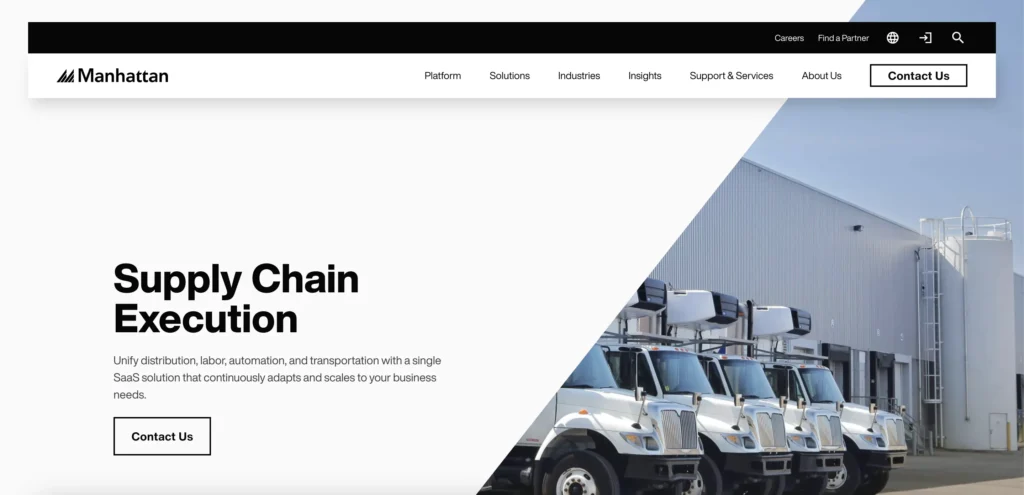
Key Features:
- Omnichannel Supply Chain Management: Optimizes both physical and online operations for seamless integration.
- Demand and Inventory Management: Improves order fulfillment through better inventory management.
- Transportation Optimization: Uses algorithms to find the best routes and reduce shipping costs.
- Real-Time Data Integration: Offers real-time data for better operational efficiency and decision-making.
Limitations:
- Implementation Complexity: Setting up Manhattan Associates SCM can be complex, requiring significant time and resources to integrate with existing systems.
- Limited for Smaller Enterprises: The software’s features and pricing are more tailored to larger companies, making it less suitable for smaller businesses or those with simpler supply chain needs.
Ratings:
G2 Rating: 4.3/5
Gartner Rating: 4.4/5
Testimonials: “Manhattan’s tools allowed us to create an efficient distribution network that reduced costs.”
Microsoft Dynamics 365 Supply Chain Management
Microsoft Dynamics 365 SCM combines supply chain tools with ERP capabilities in a single platform. It handles inventory tracking, warehouse management, and supplier collaboration in one system. Businesses already using Microsoft tools benefit from seamless integration, which helps maintain smooth operations across departments.
The interface is user-friendly, reducing training time and improving team adoption. The platform also supports risk mitigation through better communication between suppliers and internal teams. It includes sustainability tracking features, helping businesses monitor emissions across the product lifecycle. Built-in security and high uptime ensure data is protected and always accessible.
However, it has gaps in operational monitoring, making it less complete for businesses needing deep, real-time oversight. The system can also struggle with large data sets, requiring extra tuning for performance. Dynamics 365 SCM works best for mid to large-sized businesses that want an all-in-one solution with strong ERP integration.
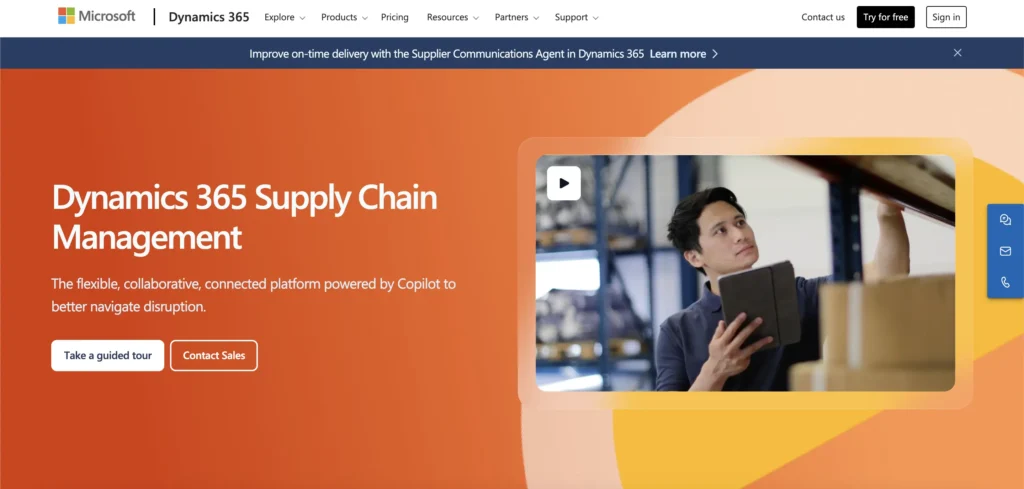
Ratings:
G2 Rating: 4.3/5
Gartner Rating: 3.7/5
Testimonials: “It has many features which make compatible for large customers with unique requirements. But still somewhat it lacks in terms of operation and monitoring as compared to other vendors.”
Logility Supply Chain Platform
Logility is a cloud-based platform built to manage planning, inventory, and forecasting through automation and advanced analytics. It provides real-time visibility into inventory and delivery schedules, helping teams respond quickly to customer demand. The system also supports end-to-end traceability, offering full documentation for sourcing, compliance, and anomaly detection.
With predictive analytics, it balances inventory levels to avoid excess stock while maintaining service levels. It integrates data from multiple sources, giving teams a global view of operations and improving adaptability. Built-in sustainability tools help businesses track emissions and reduce waste.
However, the platform has limited customization options for reports and alerts, often requiring help from support. Users also report slow response times and occasional lag when navigating between screens. Logility is a strong fit for businesses that want broad visibility and forecasting tools, but need to be prepared for slower system responsiveness.
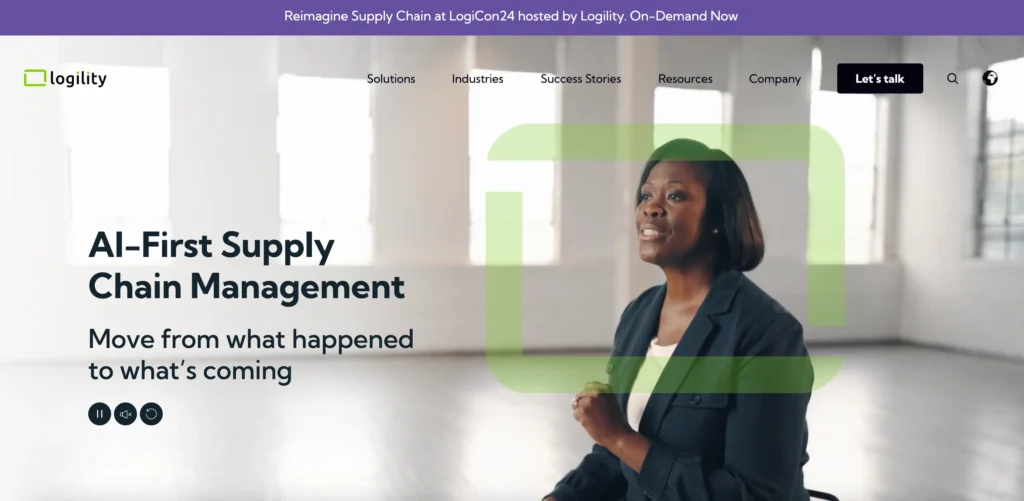
Ratings:
G2 Rating: 4.4/5
Gartner Rating: 4.6/5
Testimonials: “Very solid experience using Logility. We’re using the software to Forecast our sales and replenishment. Product can run slowly at times and hard to understand some of the commands, but the interface is easy to see.”
Coupa
Coupa, powered by Llamasoft, is built for supply chain modeling and long-term strategy. It helps businesses simulate scenarios and plan for cost, service, and carbon efficiency. The platform uses AI and machine learning to identify savings across the supply chain and support better strategic decisions.
Its digital twin technology allows teams to test different network designs before making changes. The twin map feature lets users compare current and proposed supply chain setups side by side. This makes it ideal for companies focused on network optimization rather than day-to-day execution.However, the platform lacks some advanced operational features, limiting its use beyond strategic planning. Users have also noted a decline in customer support after Coupa’s acquisition of Llamasoft. Coupa is best for organizations focused on cost modeling and supply chain design, not for those needing real-time execution tools.
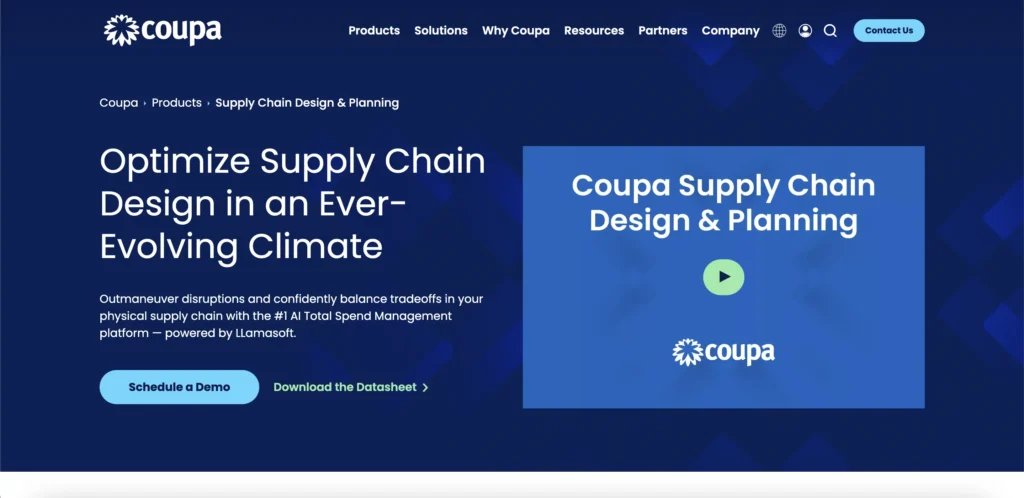
Ratings:
G2 Rating: 4.2/5
Gartner Rating: 4.7/5
Testimonials: “SI really like utilizing the Analytics sectoin of Coupa. It took awhile to get the hang of, but there is an abundance of categories, filters, etc. to choose from, in order to streamline it for my organization. I’m also able to pull raw data from variants I have built in Requests, Invoices, Suppliers, etc. in order to ensure that my tiles and dashboards have been set up correctly. I do not feel like there is enough support related to catalogs and cXML invoicing. I would like for there to be a better way to have it made public which suppliers offer catalogs (not just the Coupa Advantage suppliers).”
How to Choose the Right SCM Software for Your Business
Choosing the right software comes down to understanding your unique needs. Here’s a simple process to help you make the best decision:
- Assess Your Current Challenges: What are the main pain points in your supply chain? Is it inventory management, shipping, or something else?
- Understand Your Budget: Cloud-based SCM software can be an investment. Make sure the pricing model aligns with your business’s financial capabilities.
- Consider Your Industry: Some software solutions work better for certain industries. If you’re in retail, look for software that excels in demand planning and order management.
- Evaluate Ease of Use: Make sure the software is intuitive. The last thing you need is a steep learning curve.
Final Word
Take the time to explore your options and test different platforms. Look for software that is scalable, easy to integrate, and offers real-time data to help you make decisions. Whether you’re a small business or a large enterprise, cloud-based SCM software can help you streamline operations, reduce costs, and gain a competitive advantage.
FAQs
What is cloud-based SCM software?
Cloud-based SCM software lets you manage your supply chain through the internet. It offers real-time data, scalability, and accessibility from anywhere.
Which cloud-based SCM software is best for small businesses?
GoComet is an affordable, easy-to-use option ideal for small businesses that want to streamline freight management and logistics.
Can cloud-based SCM software improve supply chain visibility?
Yes, cloud-based software offers real-time tracking and analytics, providing full visibility into your supply chain operations to optimize their supply chain efficiencies cost-effectively.
Feel free to fix a free walkthrough demo of how GoComet’s solution can help you drive double-digit cost savings in your supply chain while eliminating all the pain points you may currently face due to the lack of automation.

